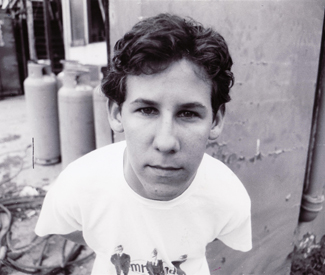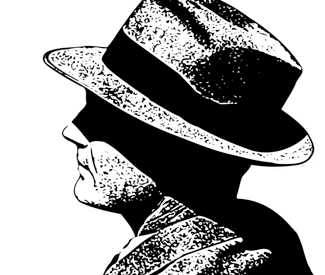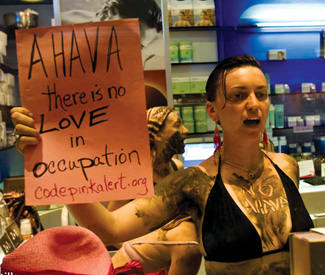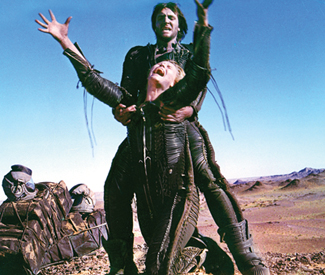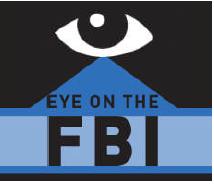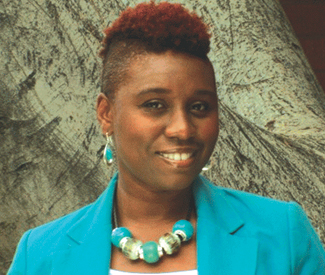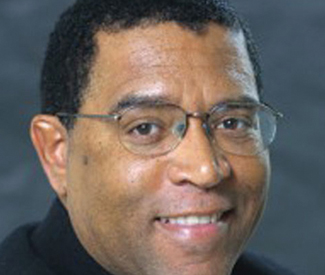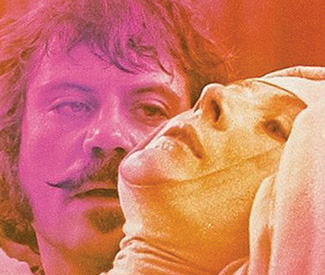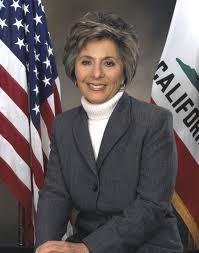Editor’s Picks
City Living
BEST VOICE OF VICTORY
Whether it’s Pablo Sandoval stepping into the box or a struggling rookie trying to catch a break, the next batter up at AT&T park is always ushered in with unwavering excitement and energy. That recognizable voice pinging around the field belongs to Renel Brooks-Moon. For 12 years, she has served as the announcer for your San Francisco Giants. Born in Oakland, Brooks-Moon currently puts the Bay Area on the map as having the only female announcer — and one of the first African American announcers — in Major League Baseball. From the team’s near-World Series victory in 2002 to the eventual 2010 World Series win, Brooks-Moon’s voice has narrated the Giants’ most shining moments. She’s even done what most of the players can’t: earn a spot in the National Baseball Hall of Fame. Heads-up to you non-sports fans, Brooks-Moon has also hosted 98.1 KISS FM’s Renel and Christie in the Morning, for 15 years.
BEST ELECTROSTATIC MEME

Photo by Phil McGrew
Currency traders who live with epic views of the Bay Bridge have all the luck. One night, they’re sitting around taking photos through the window of their apartment, the next day their shot is everyone-and-their-mothers’ Facebook cover photo. Such was the story of Phil McGrew’s picture of eight bolts of lightning hitting the Bay Bridge from that incredible April 12 spring storm. McGrew has been taking photos as a hobby for just two years, so he could have hardly expected to capture of all four of the bridge’s towers being struck by bolts — or to capture so completely the local Internet imagination. “I showed [my girlfriend] Sherry right away,” he told the UK’s Daily Mail. “She thought it was fantastic.” You and our newsfeed both, Sherry.
BEST SMOKE ON THE AIR
We love the activists on the medical marijuana scene, but you can’t attend one of the Bay’s many cannabis expos without noting that the vast majority of attendees are of the male persuasion. This is precisely what tickles us green about Merry Toppins and Vaperonica Dee’s weekly Mutiny Radio podcast Cannabis Cuts. The young women spend hours intelligently dissecting the pot news of the day, playing chilled-out stoner tunes, and conducting smooth interviews with many of the area’s Mary Jane movers and shakers. “We’re changing the idea that there could be a profile of a standard cannabis activist,” Dee told us in a recent interview. And, since public perception of stoners could be the one thing that’ll change repressive federal policy, that’s an important sound byte, indeed.
Tuesdays, 4 p.m.–6 p.m. www.mutinyradio.org
BEST TUDOR TIMEWARP
Eschew the 13-hour flight and bloody horrible exchange rate: access ye olde England in less than 30 minutes with a car ride over the Golden Gate Bridge. Nestled between Muir Beach and its nearby redwood rings is the whitewashed Pelican Inn. Visit for its cozy pub, which hosts a long list of mostly European brews — or perhaps you hanker for its traditional English fare, with greens harvested from the neighboring Zen Center and served in a dining room of dark wood illuminated by candlelight. Can’t get enough of the countryside castle vibe? Stay the night. The eco-conscious can earn their fish ‘n’ chips the car-free way — spend a few hours hiking across the Coastal Trail from bus-accessible Tennessee Valley and you’ll never need to gas up.
10 Pacific Way, Muir Beach. (415) 383-6000, www.pelicaninn.com
BEST FADES WITH FLAIR

Guardian photo by Godofredo Vasquez/SF Newspaper Co.
Guys, it’s that time again: the moment your friends have ceased to be fooled by that hat you wear to cover up the fact that you desperately need a touch-up on your fade. Never fear, the New Chicago Barbershop #3 is a time-tested solution to your lackluster attention to grooming. Plus, the place has flair: step in the shop, and feel like you’ve stepped back into the an early-1970s Fillmore District business. With pictures of Dizzy Gillespie and Muhammad Ali on the walls, a shoe shine station, and never-ending barbershop banter, this is as authentic as it gets. For 45 years, the longest-standing shop on its block has cut local stars, visiting celebrities, and everyday neighborhood residents. Just don’t let the old-school vibe fool you — New Chicago’s haircuts will make you feel like a new man.
1551 Fillmore, SF. (415) 563-9793, www.newchicagobarbershop.net
BEST BAIT BLOG

Photo via The Monkeyface News
The deep-sea-ded truth of fisherman Kirk Lombard’s angling blog the Monkeyface News is that you need never have hoisted a rod to partake in its charms. Lombard’s tales of shad runs and striped bass population numbers are interspersed with musings about German disco quartet Boney M., and complaints regarding weekday sobriety. Aiming to learn how to poke pole the blog’s titular monkeyface eels from a hands-on video, or find out whether you can use a jig to catch a rockfish? Find out here — or on Lombard’s almost-just-as-good tour site, Kirk Lombard’s Sea Forager. An ex-Department of Fish and Game surveyor, Lombard preaches sustainable fishing practices in his fishing seminars — which have included an urban fishing-foraging series conducted through Forage SF. Newbie eel hunters, you’ve come to the right place.
BEST USERS UNION
“Nothing about us, without us.” That’s the mission statement of the San Francisco Drug Users’ Union, an innovative organization sponsored by the Drug Policy Alliance that meets regularly to discuss self-advocacy in politics. If human history — and nature — is any indicator, people are never going to stop using drugs. Accepting that, it’s an easy leap to imagine, then, that drug users are people. And since drug use takes up a lot of time, and most certainly comes with its own occupational preoccupations, it stands to reason that these people deserve to be able to organize to represent their own interests (especially when they run contrary to those of the self-propagating prison-industrial complex). The SFDUU makes this logic a reality. A recent project included a showcase of professionally designed models for safe injection sites. Safe places to shoot up? It seems so sensible!
General meetings first and third Mondays, 5:30 p.m., free. 149 Turk, SF. www.sfdrugusersunion.org
BEST SQUEAKY-CLEAN QUEENDOM
Just as though it were real hamlet, Norge Laundry and Cleaning Village is guarded by two watchful matriarchs. The funky pair of female sovereigns, Lorene Howard and Genny Bruggen, have owned Norge for eight years, and recently started hosting live concerts for their people. Frequently delighting the masses are endearing glam rockers the Clarences, who set a joyful tone with Bowie face paint and handfuls of glitter confetti. They alternate with various singer-songwriters and one-man bands that defy categorization. Howard brags that Norge has the “hottest dryers in town,” but more importantly, she and Bruggen are the warmest proprietors you’re likely to find. Added bonus: get on a regular cleaning schedules and the ladies will pass you life advice, and even switch your load from washer to dryer if they find you a welcome addition to the fabric of their lives.
3908 Grand, Oakl. (510) 653-3435
BEST INDOOR PERCH FOR INFINITE INSPIRATION
Killer panoramas aren’t hard to find in San Francisco. But what if you want a bird’s eye view of beauty that’s unfettered by cold winds and within an arm’s reach from a good read? The Potrero Hill branch of the San Francisco Public Library is a modern two-story building awash in natural light. Its best spot is the row of squishy armchairs aligned inches from a wall of windows facing out over the northwestern horizon, with a clear view of the landmarks galore splayed beyond Potrero’s rooftops. Claim one of these chairs and you’ll be rewarded with an expansive landscape that’s at once geographical and intellectual, giving the contemplative bookworm both a superior vista of the peninsula and a clean, well-lighted place from which to explore the literary world.
1616 20th St., SF. (415) 355-2822, www.sfpl.org
BEST ROCK ‘EM SOCK ‘EM REVELRY
What do you do for a ‘tweenager’s birthday? Too old for a scavenger hunt, too young for a dance party, too quickly bored for pretty much anything. Except, that is, a good robot war. Thanks to Bot Bash Parties, you don’t even have to leave your house for such mechanical mania. Zachary Lytle, who built his first robot when he was younger than some of his party guests, and who has won the world robotics tournament three times, will set up a four-foot-square ring in your living room that’ll house a tournament of six vicious, whirring, cutting, flipping remote-controlled robots that can occupy as many as 24 kids. Along the way, partygoers are treated to a basic roboting lesson. For world-weary ‘tweens and their parents, this does compute.
(707) 228-5088, www.botbashparty.com
BEST DRYER DR. FRANKENSTEIN
It wheezes, it shakes, it whines, but somehow, it always gets your clothes clean. Until the day you’re ankle-deep in detergent bubbles. Time to call Noel Appliance! Noel Guzman knows just about everything that can go wrong with any brand of washer, dryer, even dishwasher. Just text him (he gets back to you in minutes), send his phone a photo of your dead machine, and let him give you an estimate right away. Chances are, Guzman can fix it for way less than it costs to buy a new one — his house calls go for $35 — so why fill landfills on account of minor mechanical problems? If the thing really is beyond repair, Noel sells floor models and good lightly used appliances for much cheaper than you can find in most stores. And he delivers.
(650) 740-5296, www.noelappliance.com
BEST BDSM BOOSTERS
Why did the American Psychiatric Association declassify homosexuality as a mental disorder in 1973? It had less to do with the goodness of the controlling body’s hearts and more to do with science: study after study failed to find a correlation between being attracted to your own gender and being any kind of crazy. It is upon this principle that the Community-Academic Consortium for Research on Alternative Sexualities (CARAS) was founded in 2005 — only with kink, BDSM, leather, and consensual non-monogamy in mind. CARAS’ mission is to educate mental health professionals on alternative sex — not to mention fund the kind of high-quality research that will make the difference when it comes to how academia, and eventually, society, looks upon a little disorderly conduct in the sensual sphere.
BEST PAWS ACROSS AMERICA
Never heard of Pawesome? Sorry — your computer-bound hours are about to take another nosedive in productivity. Don’t wag your hyperactive point-and-clicker at us: it’s for a good cause! Local besties Sonia Zjawinski and Sarah Han started the website (now bi-coastal — hey Brooklyn) out of a sheer, possibly manic affection for all things furred and feathered. A brief trip down the front page might reveal a compilation of parakeet-on-skateboard clips, a portrait of a bar kitty, or an automated laser pet toy — but will also cover serious matters, such as the story of a new shelter or a breaking animal rescue from across the country. The site also puts a focus on healthy animal feed and products, so feel redeemed patronizing its pixels — even if you came looking for that video of the doggie and guinea pig kissing.
BEST EPL IN THE AM
You know you’re in the presence of hardcore devotion when all available seats at the pub are snagged ahead of a pre-dawn English Premiere League match. Such is the reality at Danny Coyle’s. The bar’s biggest team draws are Liverpool (which lured visiting movie star Clive Owen, spotted rooting for the Reds in April), Arsenal, Manchester City, Manchester United, Chelsea, and Tottenham Hotspur. Friendly bartenders are skilled at passing pints through a crowd and ample TV screens offer good vantage points from every corner. Danny’s and nearby neighbor Mad Dog in the Fog — a larger and often even more-crowded joint — are the reason you’ll hear gasps, taunting rhymes, anguished cries, and goalllll celebrations echoing through the Lower Haight’s early a.m. mists.
668 Haight, SF. (415) 558-8375, www.dannycoyles.com
BEST TM4M TRAINING
Blood is rushing to your first chakra, you’re incredibly horny, and you’re desperate to get off. But the complexities of your body have you feeling a bit insecure about where to go to have that full-body, no-commitment release you’re craving. No fear! San Francisco is a city saturated in sex, and Eros — a safe-sex-on-premises site — hosts casual sexual forays between all kinds of men, regardless of what they have going on below the belt. Eros’ Transmen for Men (TM4M) is a unique program held every second Thursday developed to foster a dialogue between transmen and cis-men on how to have hot and steamy casual encounters with each other. There’s more: Eros is open seven days a week, and is always committed to celebrating the queer masculine spectrum.
2051 Market, SF. (415) 255-3921, www.erossf.com
BEST SKIN DEEP
Skin care and acne treatments are not the most comfortable things to which you can submit your face. But trust in the seasoned vets at Studio Abasi, a skin-miracle shop tucked above the serene and lush Berkeley City Club. You’ll walk away from the salon with a comprehensive guide to your skin, including details a regular dermatologist might forego in favor of a quick prescription. That — combined with owner Shannon Carter’s fondness for screening her favorite YouTube videos while she works to keep your mind off the pain of beauty — makes visiting Abasi feel more like swapping skin-care secrets at a sleepover than a trip to the doctor’s office. After all, your skin is the outermost layer of yourself, a sensitive subject that can often bring up emotions (and excruciating blackheads.) Better to get a skin care professional who enjoys talking it out, face-to-face.
2315 Durant, Berk. (510) 665-5544, www.studioabasi.com
BEST PRIDE ON WHEELS

Photo by Trevor Traynor
Though some may quibble with the presence of lowriders at Sunday Streets in the Mission — you can often find the hydraulic-enabled, candy-painted whips parked off 24th Street as they prepare to roll out in high-gloss fashion — the cars actually recall an important chapter of the neighborhood’s history that doesn’t get enough play. According to Roberto Hernandez of the SF Lowrider Council, lowriding the Mission’s main drags was so popular in the 1980s that tourist buses would come to check out the cars, causing traffic that led to police intervention and brutality. The Council was formed in response to the harassment, and is experiencing a rebirth these days as lowriding comes back into fashion. Nowadays, member clubs have five to 30 members of all genders and races. The only requirement to join, says Hernandez, is a “finished, tight, ready-to-roll lowrider.”
(415) 206-0577
BEST MUSHROOMING POPULARITY
Enough tripping over yourself at music festivals — the best kind of festive fungi has to be that which is found at the ever-growing SF Mycological Society’s Fungus Fair. Each December, Bay Area mycophiles meet up for a weekend (usually in Berkeley’s Lawrence Hall of Science) to enjoy lectures, vendors selling mushroom-dyed sweaters, and entire rooms full of specimens hand-picked by members of the Society. Attendees can also take advantage of copious class offerings: ever wondered, for instance, about the best way to serve a black chanterelle? Take the mushroom cooking class. Best of all, you can find out what SFMS gets up to during the rest of the year: San Francisco is home to the country’s longest-running mycology programs (at SF State), and the Society hosts beginners’ foraging hikes all throughout the year for the budding, mushroom-loving spore.
BEST PLACE TO FLIP OUT

Guardian photo by Brittany M. Powell
It sits, waiting for the next young bendy soul: a vast, matted wonderland of balance beams, pommel horses, uneven bars, and gargantuan trampolines ready to be bounced upon and jackknifed off of. American Gymnastics Club has been molding San Francisco’s Kylie Ross hopefuls into competitors for decades. Though simple somersault class is available for preschoolers, those with thighs of steel and grace to boot can sign up for the competitive program, where they can vie for college athletic scholarships and test their nerves at state championships. Visit its Judah location — an institution — or the newer Bayshore facility. Both offer ample classes for the little one, or, if you wanna hit the mat as well, tykes from 18 months to three years can bring in the ‘rents for parent participation-friendly classes.
2520 Judah, SF. (415) 731-1400; 390 Bayshore, SF. (415) 920-1704, www.americangymnasticsclub.com
BEST LABORATORY FOR MOLE-DING YOUNG MINDS
There’s a frozen fox in the fridge, an assortment of snakes on the sideboard, and a hedgehog hunkered down in a little pen. There are gadgets whirring and vibrating, measuring the cacophony from a caboodle of broken-down instruments. There are pulleys and levers and bells and whistles and plenty of chemicals that make a good bang. And at the Mission Science Workshop, there’s no slab coat required — just a healthy dose of curiosity. Founder Dan Sudran encourages kids of diverse backgrounds to squish, mold, spin, and explore — whether it’s making giant cardboard strands of DNA; playing with vacuums and electromagnets; or assembling your very own vermin from individual containers filled with teeny-tiny pelvises, scapulae, and spines at the Build-a-Mole station — batteries not included.
3750 18th St., SF. (415) 621-1240, www.missionscienceworkshop.org
BEST MOTHERBOARD MOTHERSHIP
Started by partners Azam Khan and Oliver Maddox last winter as part of the duo’s quest to offer fair rates on Apple and high-end PC repair, Love Haight Computers deals in new machines, plus customization, refurbishment, diagnostic services, accessories — and rotating art displays? One of the shop’s goals is to support its community, so it makes perfect sense to showcase the artwork of deserving friends for the tech-needy to peruse. If Best Buy makes you squirm and Geek Squad’s orange-and-blue offends your delicate aesthetic sensibilities, head to this Lower Haight comp store-art show. Bonus point: Khan is easily one of the most charismatic tech geeks we’ve met in ages, and he promises “not to rip you off.”
437A Haight, SF. (415) 799-4600, www.lovehaightcomputers.com
BEST FOUND IN TRANSLATION
Though that old cautionary tale of the Chevy Nova selling badly in Spanish-speaking countries (Get it? No va?) is apocryphal, there is still plenty of research each year dedicated to the economic impacts associated with poor or culturally-insensitive translation. But who is watching out for the less tangible art of translation of, well, art — and its potential for cultural cross-pollination? In fact, that would be the Center for the Art of Translation. The non-profit organization won’t help your company make overseas business deals, but it will help broaden our cultural understanding through outreach, education, and public events. By helping to support translators, giving children tools for literacy and critical thinking, and hosting public talks, the Center makes our world a little smaller and a whole lot richer.
582 Market, SF. (415) 512-8824, www.catranslation.org
BEST NEW GROWTH FOR OLD ROOTS
There were the decadent early years as the apex of luxe accommodations for 1930s travelers, and there was the ignominious segregationist past. There were mid-century decades as a soppy, swinging, jazz, funk, and blues-infused cultural mecca, and there was the descent into disrepair and the tenure as over-crowded and under-loved SRO. From evictions to an ultimate rebirth, Oakland’s iconic Hotel California has weathered many seasons. Now a low-income housing development, the landmark boasts the Hotel California Garden, a thriving greenhouse enterprise and farm which, in partnership with the People’s Grocery, sponsors programming and events, and acts as a hub for community building and gathering. The garden has supported the emergence of a resident’s council, hosts volunteers for work days, and employs hotel residents to grow and tend edible plant starts which are sold at an affordable price throughout the larger community. Most definitely a spring-like awakening.
3501 San Pablo, Oakl. (510) 652-7607
BEST SUPERFRIENDS
The “It Gets Better” campaign may get all a lot of press when it comes to encouraging queer teens to hang in there in the face of bullying and fear, and not succumb to depression. But there’s an amazing organization that, for the past 14 years, has been working to empower teens to make it better right now. (It even recently launched the Make It Better Project to directly involve teens in making schools safer for LGBTQ peers.) The Gay Straight Alliance Network started in San Francisco and has grown into a hugely popular global entity, uniting queer and questioning teens and straight allies in the fight against homophobia through classroom interaction and school activities. Last year’s Northern California GSA youth conference trained hundreds of young activists to help teachers comply with California’s new FAIR Education act, which requires schools to include factual information about gay people in existing social studies lessons. These brave kids don’t want to wait to move toward acceptance.
BEST FUTURE OF THE PRESS
This might get a little meta, so pull up a bar stool, grab a stiff drink, and bear with us. Better yet, let’s go down to Local Edition bar, where the walls are adorned with perfectly preserved newspapers from the great days of print journalism (ahem, not yet over by the way) and the cocktail menu, designed by Ian Scalzo of Bourbon and Branch, offers playful twists on classics any fedora-sporting muckraker worth her salt would be more than familiar with. Yes, in the plush, Art Deco-ish space you’ll find displayed a copy of the Guardian’s first issue from October 1966 and other legendary artifacts of historic Bay Area journalistic output, yellow or otherwise, plus a vintage typewriter or two. It’s a dreamy wayback machine for romance-addled Lois Lanes and Clark Kents — and it all takes place in the basement that once housed the Examiner’s (and The Call’s) printing press. There is nary an emoticon, comments section, or LOLcat in sight. If the future of print is leading to this sort of thing, we’ll stick with ink and drink.
691 Market, SF. (415) 795-1375, www.localeditionsf.com
BEST PRAYER FOR UNITY
A sanctuary that offers religion to some and is open to all, St. Cyprian’s Episcopal Church genuinely lives by JC’s should-be truism, “there are no outcasts and all are welcome.” Volunteers from the church’s congregation manage the Cyprian’s Arc community center, which opens its doors wide as a music venue and meeting space for neighbors of every age, belief system, and background. Local activists, like those from the sustainability-driven Wigg Party, organize workshops and events within the St. Cyprian’s public areas. And the 89-year-old church’s efforts at community building, such as a recent oral history project, remind Panhandle neighbors that even — perhaps especially — in a rapidly changing community, they are connected at the roots of the ‘hood.
2097 Turk, SF. (415) 567-1855, www.saintcyprianssf.org


